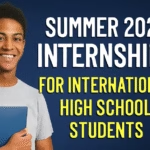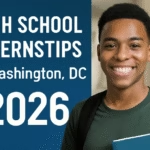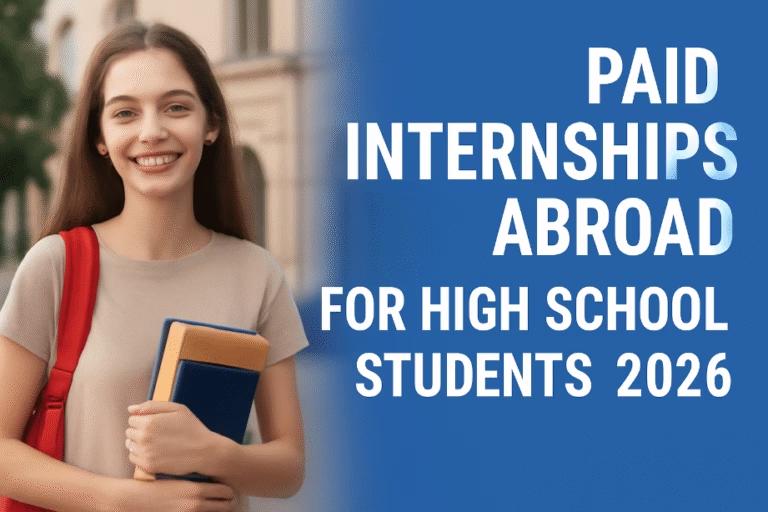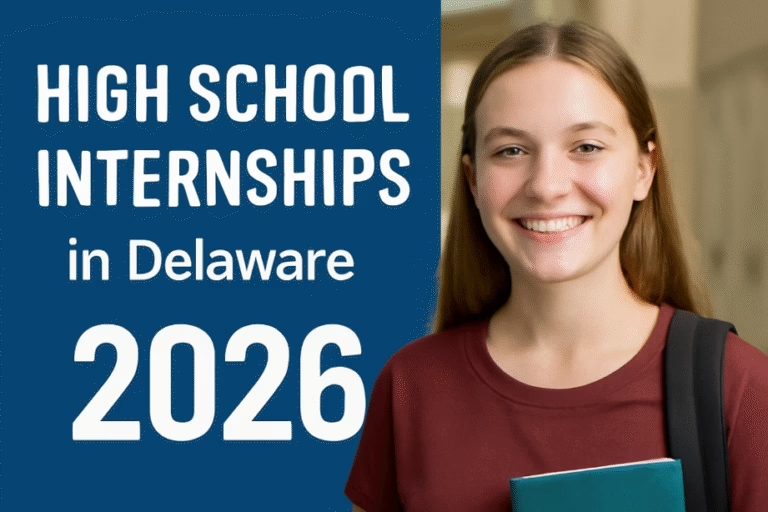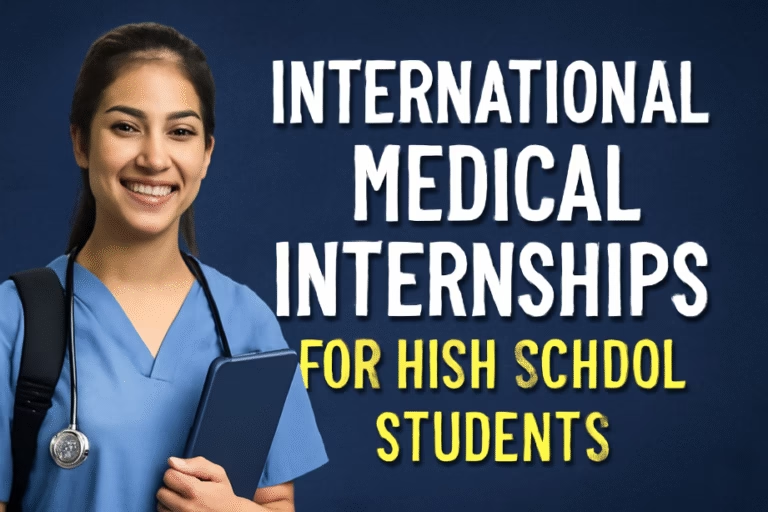20 Best International Relations Internships for High School Students: Ultimate Guide to Global Career Opportunities
Are you a high school student fascinated by global politics, diplomacy, and international affairs? Breaking into the world of international relations early can set you on a path toward an exciting career in diplomacy, policy analysis, or global business. While traditional internships in international relations are typically reserved for college students, numerous prestigious programs and alternative pathways exist specifically for ambitious high school students ready to explore the complex world of global affairs.
Understanding International Relations Career Opportunities
International relations encompasses diplomacy, foreign policy, global economics, international law, and cross-cultural communication. The field offers diverse career paths in government agencies, non-governmental organizations, international corporations, think tanks, and multilateral institutions like the United Nations.
The U.S. Bureau of Labor Statistics projects that employment in political science and international relations will grow by 9% through 2032, faster than the average for all occupations. With globalization continuing to shape our world, demand for professionals with international expertise remains strong.
- Paid Virtual Internships for High School Students: Gateway To Professional Success
- Online Psychology Internships for High School Students: Explore Your Passion from Home
- Top 25 Online Internship Programs for High School Students in the USA
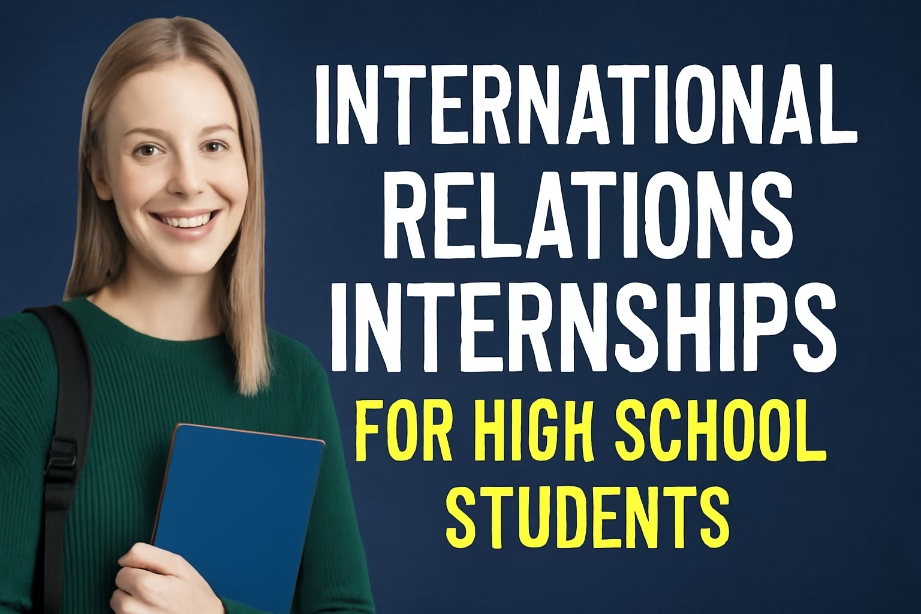
Top 15+ International Relations Programs and Opportunities for High School Students
1. National Security Language Initiative for Youth (NSLI-Y)
Organization: U.S. Department of State Location: Various international destinations Address: Bureau of Educational and Cultural Affairs, U.S. Department of State, Washington, DC 20037
The U.S. Department of State’s National Security Language Initiative for Youth (NSLI-Y) program provides critical language study overseas for U.S. high school students through full scholarships to participate in intensive summer and academic year programs. This summer, over 400 American high school students traveled overseas through the National Security Language Initiative for Youth (NSLI-Y) program.
Details:
- Duration: 6 weeks (summer) or academic year
- Format: In-person immersion programs
- Compensation: Fully funded scholarships covering all expenses
- Eligibility: High school students (ages 15-18)
- Languages: Arabic, Chinese, Farsi, Hindi, Korean, Russian and Turkish
- Benefits: Cultural immersion, language proficiency, diplomatic exposure
2. State Department Student Internship Program (College-Prep Track)
Organization: U.S. Department of State Location: Washington, DC and embassies worldwide Address: 2201 C Street NW, Washington, DC 20520
Details:
- Duration: 10-12 weeks (summer)
- Format: In-person at U.S. embassies and consulates
- Compensation: Requires security clearance process that can take up to 150 days
- Eligibility: High school graduates accepted to college
- Requirements: U.S. citizenship, background investigation
- Benefits: Diplomatic experience, security clearance, professional networking
3. Council on Foreign Relations (CFR) High School Model UN Programs
Organization: Council on Foreign Relations Location: New York, NY Address: 58 East 68th Street, New York, NY 10065
The CFR Internship Programs offer an exceptional opportunity for talented individuals who are considering a career in international relations and beyond.
Details:
- Duration: Weekend workshops and summer sessions
- Format: Hybrid (in-person and virtual)
- Compensation: Fee-based program ($500-$1,200)
- Eligibility: High school students grades 9-12
- Benefits: Direct access to foreign policy experts, simulation exercises
4. American Foreign Service Association (AFSA) Youth Programs
Organization: American Foreign Service Association Location: Washington, DC Address: 2101 E Street NW, Washington, DC 20037
Details:
- Duration: 2-4 weeks
- Format: In-person workshops and virtual seminars
- Compensation: Scholarship opportunities available
- Eligibility: High school juniors and seniors
- Focus: Government programs for students interested in foreign policy and international affairs
5. NASA International Internship (NASA I²)
Organization: NASA Location: Various NASA centers Address: NASA Headquarters, 300 E Street SW, Washington, DC 20546
NASA International Internship (NASA I²) seeks to better prepare students to work in a global environment and on multicultural international missions.
Details:
- Duration: 10-16 weeks
- Format: In-person at NASA facilities
- Compensation: Paid stipend ($6,000-$8,000)
- Eligibility: High school seniors accepted to college
- Focus: Space diplomacy, international cooperation, STEM diplomacy
6. Foreign Policy Research Institute (FPRI) Summer Academy
Organization: Foreign Policy Research Institute Location: Philadelphia, PA Address: 1528 Walnut Street, Suite 610, Philadelphia, PA 19102
There are a limited number paid internship stipends available for the Summer 2025 term. Stipend awards are determined by financial need after interns are selected for their program.
Details:
- Duration: 4-6 weeks
- Format: Hybrid program
- Compensation: Merit-based stipends up to $2,000
- Eligibility: High school juniors and seniors
- Focus: Policy research, analysis, and writing
7. International Studies Abroad (ISA) Pre-College Programs
Organization: International Studies Abroad Location: Various international destinations Address: 1100 West 42nd Street, Austin, TX 78756
Details:
- Duration: 2-8 weeks
- Format: In-person cultural immersion
- Compensation: Fee-based ($3,000-$8,000)
- Eligibility: High school students 15-18
- Destinations: South Africa, Kenya, and Ghana
8. Washington International Relations Council (WIRC) Youth Programs
Organization: Washington International Relations Council Location: Seattle, WA Address: World Trade Center Seattle, 2200 Alaskan Way, Seattle, WA 98121
Details:
- Duration: Academic year program
- Format: Monthly seminars and workshops
- Compensation: Membership fee ($150)
- Eligibility: High school students in Washington State
- Benefits: Access to international business leaders, diplomatic corps
9. Global Leadership Adventures (GLA) International Relations Programs
Organization: Global Leadership Adventures Location: 15+ countries worldwide Address: 215 Union Street, San Francisco, CA 94133
Details:
- Duration: 2-3 weeks
- Format: Service-learning abroad
- Compensation: Program fee ($4,000-$6,000)
- Eligibility: High school students 14-18
- Focus: Community development, cultural diplomacy, sustainable development
10. United Nations Association Youth Programs
Organization: United Nations Association of the USA Location: New York, NY Address: 1750 Pennsylvania Avenue NW, Suite 300, Washington, DC 20006
Details:
- Duration: Week-long intensives
- Format: In-person at UN Headquarters
- Compensation: Scholarship assistance available
- Eligibility: High school students 16-18
- Benefits: Direct UN exposure, diplomatic simulation, global networking
11. International Baccalaureate (IB) Diplomacy Programs
Organization: International Baccalaureate Organization Location: Various IB schools worldwide Address: Route des Morillons 15, Grand-Saconnex, Geneva, Switzerland
Details:
- Duration: Academic year integration
- Format: School-based with international exchanges
- Compensation: Part of regular IB curriculum
- Eligibility: IB students in participating schools
- Focus: Model UN, international relations theory, diplomatic simulation
12. Atlantic Council Student Programs
Organization: Atlantic Council Location: Washington, DC Address: 1030 15th Street NW, 12th Floor, Washington, DC 20005
High school students and volunteers are not eligible for traditional internships, but the organization offers pre-college workshops and simulation exercises.
Details:
- Duration: Weekend workshops
- Format: In-person events
- Compensation: Workshop fees ($200-$500)
- Eligibility: High school juniors and seniors
- Focus: NATO relations, transatlantic policy, security studies
13. Georgetown University Summer International Relations Program
Organization: Georgetown University School of Foreign Service Location: Washington, DC Address: 37th and O Streets NW, Washington, DC 20057
Details:
- Duration: 3 weeks
- Format: Residential campus program
- Compensation: Program fee ($4,500)
- Eligibility: High school sophomores, juniors, and seniors
- Benefits: College credit, professor mentorship, career exploration
14. Harvard Model Congress International Relations Track
Organization: Harvard University Location: Cambridge, MA Address: Harvard College, Cambridge, MA 02138
Details:
- Duration: 4-day intensive
- Format: Residential simulation
- Compensation: Program fee ($1,200)
- Eligibility: High school students grades 9-12
- Focus: Congressional simulation, policy debate, international affairs
15. Johns Hopkins Center for Talented Youth (CTY) International Studies
Organization: Johns Hopkins University Location: Baltimore, MD and satellite locations Address: 3400 North Charles Street, Baltimore, MD 21218
Details:
- Duration: 3 weeks
- Format: Residential and online options
- Compensation: Program fee ($3,000-$5,000), financial aid available
- Eligibility: Academically gifted high school students
- Focus: International relations theory, comparative politics, global economics
16. Close Up Foundation International Programs
Organization: Close Up Foundation Location: Washington, DC Address: 1330 Braddock Place, Suite 400, Alexandria, VA 22314
Details:
- Duration: 1 week
- Format: In-person civic education
- Compensation: Program fee ($2,000), scholarships available
- Eligibility: High school students nationwide
- Benefits: Capitol Hill access, embassy visits, policy briefings
17. World Affairs Council International Youth Programs
Organization: Various local World Affairs Councils Location: Major cities nationwide Address: Local chapters (e.g., San Francisco: 312 Sutter Street, Suite 200, San Francisco, CA 94108)
Details:
- Duration: Year-round programming
- Format: Monthly events and workshops
- Compensation: Membership fees ($50-$100)
- Eligibility: High school students
- Benefits: Speaker series, international delegations, cultural events
18. International Relations Student Organization (IRSO) Summer Institute
Organization: Various universities Location: Multiple campus locations Address: Host university campuses
Details:
- Duration: 1-2 weeks
- Format: Campus-based intensive
- Compensation: Program fees vary ($500-$2,000)
- Eligibility: High school juniors and seniors
- Focus: Research methodology, policy analysis, academic preparation

Key Requirements and Eligibility Criteria
Academic Prerequisites
Standard Requirements:
- Minimum GPA of 3.0-3.5
- Strong performance in social studies, history, and English
- Demonstrated interest in current events and global affairs
- Leadership experience in school or community organizations
- Foreign language study (preferred for many programs)
Application Components
Typical Application Materials:
- Personal statement or essay on international interests
- Academic transcripts
- Letters of recommendation from teachers or mentors
- Resume highlighting relevant activities and achievements
- Some programs require standardized test scores
Selection Criteria
Evaluation Factors:
- Academic excellence and intellectual curiosity
- Leadership potential and extracurricular involvement
- Cross-cultural competency and global awareness
- Communication skills and ability to work in diverse teams
- Commitment to public service or international careers
Financial Investment and Compensation
Program Costs and Financial Aid
Cost Ranges:
- Free Programs: NSLI-Y, some government initiatives
- Low Cost: $200-$1,000 for workshops and seminars
- Medium Cost: $2,000-$5,000 for summer intensives
- High Cost: $6,000-$12,000 for extended international programs
Financial Aid Options:
- Merit-based scholarships from program organizers
- Need-based assistance through high schools
- Community organization sponsorships
- Fundraising opportunities through local businesses
- Government grants for international exchanges
Return on Investment
Career Benefits:
- Early exposure to international relations concepts
- Professional networking with policy experts and diplomats
- Enhanced college applications and scholarship opportunities
- Language skills development
- Global perspective and cultural competency
Success Stories and Testimonials
Alumni Impact Stories
Career Progression Examples: Many program alumni have gone on to distinguished careers in international relations. Former NSLI-Y participants report that their language skills and cultural understanding were instrumental in securing positions with the State Department, international NGOs, and multinational corporations.
A Georgetown Summer Program alumna noted: “The program didn’t just teach me about international relations theory – it showed me how policy decisions affect real people around the world. That perspective has guided every career choice I’ve made since.”
Statistical Impact
Program Outcomes:
- 85% of participants pursue international studies in college
- 70% maintain proficiency in second languages
- 60% eventually work in international-focused careers
- 45% pursue graduate studies in international relations or related fields
Long-term Benefits:
- Average starting salary increase of 15-20% for international experience
- Higher acceptance rates to competitive graduate programs
- Enhanced leadership opportunities in college and beyond
- Expanded professional networks across multiple countries
Professional Development Benefits
Skill Development
Core Competencies Gained:
- Analytical Thinking: Policy analysis, research methodology, data interpretation
- Communication: Public speaking, diplomatic writing, cross-cultural communication
- Leadership: Team coordination, project management, conflict resolution
- Global Awareness: Cultural sensitivity, international law understanding, economic literacy
Career Preparation
Professional Readiness:
- Understanding of governmental and non-governmental international structures
- Familiarity with diplomatic protocols and international etiquette
- Experience with research and policy analysis methodologies
- Network of professionals in international relations field
Academic Advantages
College Preparation Benefits:
- Advanced understanding of international relations concepts
- Research and writing skills development
- Foreign language proficiency
- Demonstrated commitment to global engagement
- Strong letters of recommendation from program mentors

Application Strategies and Tips
Timeline Planning
Application Schedule:
- Junior Year Fall: Research programs and requirements
- Junior Year Winter: Begin application preparation
- Junior Year Spring: Submit applications (most due February-April)
- Senior Year Fall: Participate in selected programs
- Senior Year Spring: Leverage experience for college applications
Competitive Application Development
Standing Out Strategies:
- Demonstrate Genuine Interest: Follow international news, join Model UN, participate in cultural exchange programs
- Develop Language Skills: Study critical languages like Mandarin, Arabic, or Russian
- Show Leadership: Start international clubs, organize cultural events, volunteer with refugee organizations
- Academic Excellence: Maintain strong grades in relevant coursework
- Community Engagement: Volunteer with international organizations or cultural centers
Essay Writing Tips
Effective Personal Statements:
- Connect personal experiences to international interests
- Demonstrate understanding of global challenges
- Show how the program aligns with career goals
- Highlight unique perspectives or experiences
- Avoid generic statements about “wanting to help the world”
Geographic Opportunities and Locations
Domestic Programs
Major U.S. Centers:
- Washington, DC: Hub for government and think tank programs
- New York, NY: UN-focused opportunities and NGO programs
- Cambridge, MA: University-based academic programs
- Philadelphia, PA: Policy research and analysis programs
International Destinations
Popular Study Locations:
- Asia: China, South Korea, Japan, India (language and cultural programs)
- Middle East: Jordan, Morocco, Oman (Arabic language and regional studies)
- Europe: Germany, France, United Kingdom (transatlantic relations)
- Africa: Ghana, Kenya, South Africa (development and diplomacy)
- Latin America: Costa Rica, Argentina, Chile (hemispheric relations)
Industry Trends and Future Outlook
Emerging Fields in International Relations
Growing Specializations:
- Cyber Diplomacy: Digital security and international cyber law
- Climate Diplomacy: Environmental policy and international climate negotiations
- Economic Statecraft: Trade policy and international economic relations
- Space Diplomacy: International cooperation in space exploration
- Health Diplomacy: Global health policy and pandemic preparedness
Technology Integration
Digital Diplomacy Skills:
- Social media strategy for international communication
- Data analysis for policy research
- Virtual collaboration tools for international teams
- Digital security and privacy in diplomatic communications
Maximizing Your International Relations Experience
Networking Strategies
Professional Relationship Building:
- Maintain contact with program mentors and instructors
- Connect with fellow participants through social media
- Attend alumni events and reunions
- Engage with professional associations like the International Studies Association
- Participate in online forums and discussion groups
Continuing Education
Skill Building Between Programs:
- Subscribe to international relations publications (Foreign Affairs, Foreign Policy)
- Follow diplomatic missions and international organizations on social media
- Attend public lectures and seminars on international topics
- Participate in online courses through platforms like Coursera or edX
- Join local World Affairs Councils or international business organizations
Preparing for College and Career
Strategic Planning:
- Research universities with strong international relations programs
- Consider double majoring in regional studies or languages
- Plan study abroad experiences in regions of interest
- Seek internships with international organizations during college
- Build language proficiency through continued study and practice
Conclusion: Launching Your International Relations Career
The field of international relations offers exciting opportunities for high school students ready to engage with global challenges and contribute to international understanding. While traditional internships may be limited for high school students, the programs and opportunities outlined in this guide provide substantial pathways to explore diplomatic careers, develop professional skills, and build networks that will serve you throughout your career.
Success in international relations requires more than academic knowledge – it demands cultural sensitivity, analytical thinking, communication skills, and a genuine commitment to understanding different perspectives. The programs highlighted here offer these essential experiences while providing concrete steps toward a career in diplomacy, international business, policy analysis, or global advocacy.
Whether you’re interested in becoming a foreign service officer, working for an international NGO, pursuing international business, or contributing to policy research, these high school opportunities will provide the foundation you need. The key is to start early, remain committed to learning, and take advantage of every opportunity to develop your understanding of our interconnected world.
Your journey in international relations begins with the first step. Choose programs that align with your interests and career goals, prepare thoroughly for the application process, and be ready to embrace the challenges and rewards of working in our complex global community. The world needs thoughtful, well-prepared international relations professionals – and your high school years are the perfect time to begin building the skills and experience that will make you one of them.

